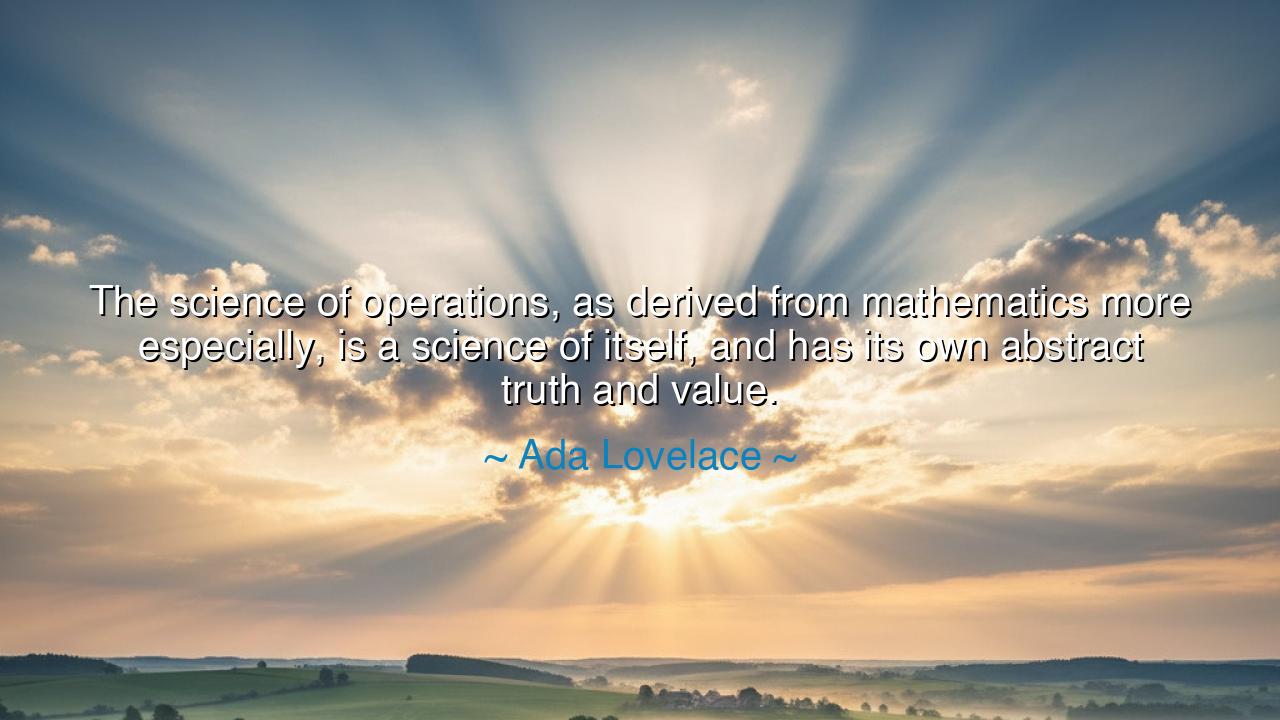
The science of operations, as derived from mathematics more
The science of operations, as derived from mathematics more especially, is a science of itself, and has its own abstract truth and value.






Hear, O seekers of knowledge, the words of Ada Lovelace, the great visionary who saw in mathematics and operations not just tools of calculation, but the very essence of a new world of abstract truth. She said, "The science of operations, as derived from mathematics more especially, is a science of itself, and has its own abstract truth and value." These words resonate with a profound understanding of mathematics not merely as a means to solve practical problems, but as a language unto itself—one that uncovers the deeper truths of the universe. For Lovelace understood that mathematics, especially the science of operations, holds within it the seeds of invention, the foundation of logic, and the key to understanding the natural world.
In the ancient world, the search for truth through reason was sacred. The philosophers of Greece, such as Pythagoras and Euclid, saw mathematics as the language of the divine, the very structure upon which the universe is built. Pythagoras famously said, "All is number," recognizing that the cosmos is governed by mathematical principles that shape everything from the movement of the stars to the proportions of the human body. Euclid’s Elements laid out the foundation for geometry, showing that through logical operations and abstract reasoning, we can understand the invisible laws that govern both the earth and the heavens. Lovelace’s insight builds upon this ancient legacy, recognizing that mathematics is not simply a tool for mundane calculations, but a science unto itself, with its own intrinsic beauty and value.
Ada Lovelace, in her writings, particularly in her work on the analytical engine with Charles Babbage, recognized the profound potential of mathematical operations to transcend the limits of human thought. She understood that machines could one day perform calculations not just for practical tasks, but as engines of abstract thought. In her visionary notes, she described how the analytical engine, a mechanical precursor to the computer, could be used to perform not only arithmetic but also to process abstract ideas—a leap in understanding that has become the foundation for modern computing. Lovelace’s vision was not simply to use machines for the practical benefit of society, but to unlock a new world of abstract thinking—a realm where mathematical operations became a tool for exploring ideas, patterns, and logic.
The science of operations, as Lovelace described it, is not bound by the practicalities of the world. It is a realm of abstract truth, where mathematical principles are explored not for their immediate use, but for their ability to reveal the deeper nature of existence. **Consider the example of Isaac Newton, whose work in calculus allowed him to describe the motion of celestial bodies, not just in terms of observable phenomena, but through the abstract relationships that governed them. Newton did not simply observe how objects fell or planets moved; he sought the mathematical laws that explained their movement in a way that was timeless and universal. In this sense, the science of operations was not just a tool, but a language that helped him uncover the very structure of the universe.
The lesson, O children of wisdom, is this: mathematics is not just a means to an end, but a language of deep truth, a realm of abstract beauty that allows us to understand the fundamental workings of the world. Lovelace’s words remind us that the value of mathematical operations lies not only in their ability to solve practical problems but in their capacity to unlock the hidden patterns that govern the cosmos. The science of operations is a discipline of discovery, a path to understanding that transcends the practical and reaches toward the infinite.
In your own lives, do not think of mathematics or logic as mere tools for solving problems, but as a gateway to the abstract truths that shape all of existence. Seek to understand not just how things work, but why they work—to explore the patterns that exist beneath the surface of reality. Whether you are engaged in science, art, or philosophy, remember that the abstract and the practical are intertwined. The most profound discoveries often arise from the willingness to think in abstract terms, to explore ideas beyond the tangible world.
Rise, O seekers of truth, and embrace the power of the abstract. Let the science of operations be your guide, not only in solving the problems of today but in discovering the deeper truths that await you. Just as Ada Lovelace foresaw the future of computation as a realm for the abstract exploration of thought, so too must you see the mathematical language as a tool not for immediate gain, but for unlocking the infinite mysteries of the universe. In this pursuit, you will discover not just facts, but the very fabric of existence itself. Let mathematics be not just a means to an end, but a path to a higher understanding—a bridge between the visible and the invisible, between the practical and the eternal.






AAdministratorAdministrator
Welcome, honored guests. Please leave a comment, we will respond soon